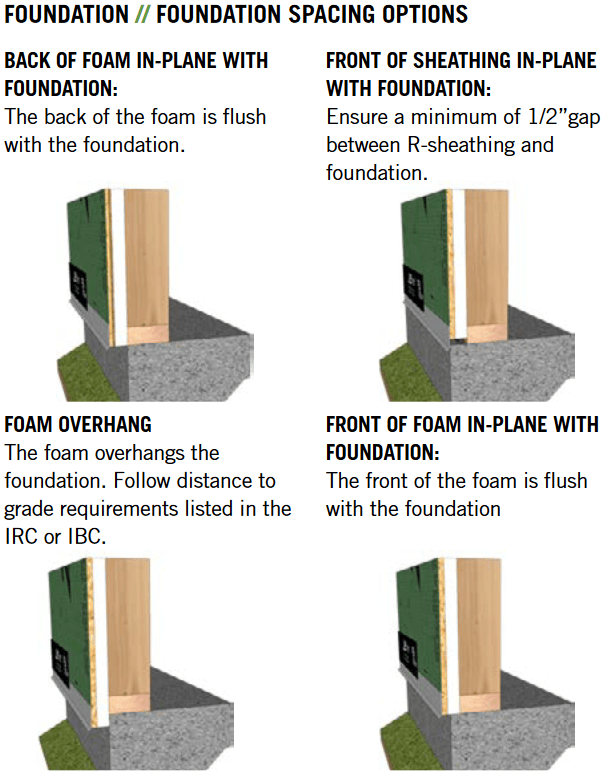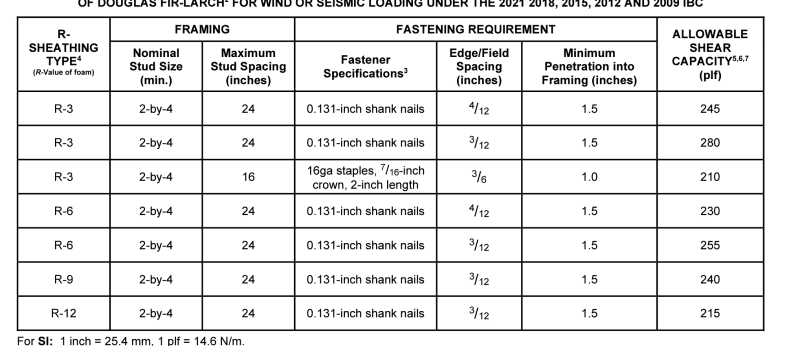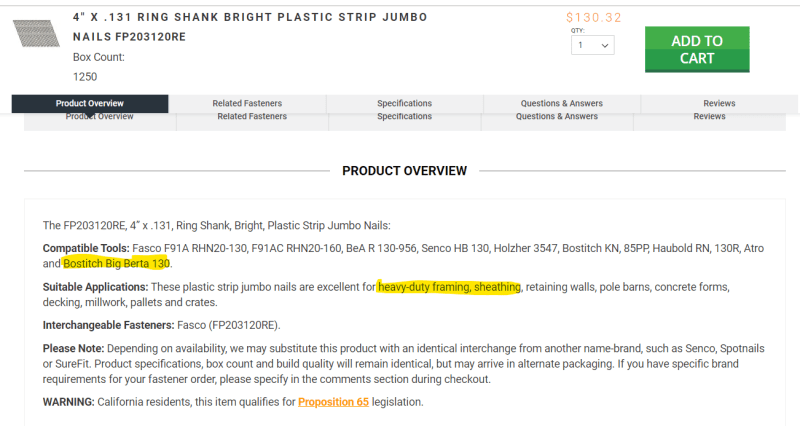Navigation
Install the app
How to install the app on iOS
Follow along with the video below to see how to install our site as a web app on your home screen.
Note: This feature may not be available in some browsers.
More options
Style variation
-
Congratulations MintJulep on being selected by the Eng-Tips community for having the most helpful posts in the forums last week. Way to Go!
You are using an out of date browser. It may not display this or other websites correctly.
You should upgrade or use an alternative browser.
You should upgrade or use an alternative browser.
Zip-R 3
- Thread starter XR250
- Start date
- Status
- Not open for further replies.
That's a good point. If there's a builder involved with the project, ask them if they can get such a nail.
I would be willing to bet that this gets installed with the wrong nails unless there's a lot of oversight. This probably requires a special nail gun, if it even exist.
You're almost better off using interior drywall for shear rather than ZIP-R.
I would be willing to bet that this gets installed with the wrong nails unless there's a lot of oversight. This probably requires a special nail gun, if it even exist.
You're almost better off using interior drywall for shear rather than ZIP-R.
- Thread starter
- #3
- Thread starter
- #4
Looks like they do exist...
Once they price out having you on site the entire time they're sheathing it to inspect nail guns and nails and observe installation, they may find that the regular Zip system with exterior foam insulation is cheaper and they'll have a stronger house as a result.
Right there with you.
XR250 said:I hate this crap.
Right there with you.
-
1
- #6
jerseyshore
Structural
I have seen a lot more Zip R since the code update this past yr. Insulation requirements have basically eliminated 2x4s as an option so people are moving to Zip R. I've only seen the R-3 option but looks like they'll be getting Big Berta and oversized nails for this one.
-
1
- #8
Flotsam7018
Structural
These guys here using a pretty awesome high pressure nail gun, the Max HS130, for the exact situation: Link
A great channel to follow as well, I like to pretend all the framers we work with are this competent - it helps me sleep better at night. I believe that nailer can do up to a 12d common diameter that's 5-1/8" long, so the complaint about not being able to find collated common nails isn't that valid. This high pressure system also means the weight of the nailer is pretty lightweight, though is does require a special compressor.
A great channel to follow as well, I like to pretend all the framers we work with are this competent - it helps me sleep better at night. I believe that nailer can do up to a 12d common diameter that's 5-1/8" long, so the complaint about not being able to find collated common nails isn't that valid. This high pressure system also means the weight of the nailer is pretty lightweight, though is does require a special compressor.
Flotsam7018
Structural
I rarely can get Zip-R to work with the amount of fully sheathed wall the arch leaves. Make sure you read all the footnotes, the last time I looked into Zip-R it only allowed the segmented method.
Flotsman, they show the air pressure at 315psi. Yikes, that could be a 10k screw compressor to keep up with that. We upgraded some roof deck one year and they needed a ridiculous number of nails. They had a 8gal compressor on site, and that was a pain.
We work on a lot of homes that use Zip R - we typical will use it in combination with interior gyp for shear walls where the loads are low and there are lots of long walls. At walls with high capacity, we specify 1/2" sheathing to be installed directly to to the studs to take the shear, and the Zip R goes over that for the insulation, so the main shear walls are all 1/2" thicker.
- Thread starter
- #12
8thStreet said:we specify 1/2" sheathing to be installed directly to to the studs to take the shear, and the Zip R goes over that for the insulation, so the main shear walls are all 1/2" thicker.
I have done that more than once. Sometimes they use thinner Zip at those locations.
8thStreet said:At walls with high capacity, we specify 1/2" sheathing to be installed directly to to the studs to take the shear, and the Zip R goes over that for the insulation
What's the point of that? Why not just use standard sheathing and then put standard XPS foam over the top? Using the ZipR over regular sheathing feels very expensive with little to nothing gained. While I could see ZipR being a bit of a cost savings over the more 'traditional' continuous insulation, I am curious on the cost difference.
- Thread starter
- #14
One benefit I see is that the siding nails do not have to cantilever thru the foam. I never do an entire house like this - just specific areas and it keeps it consistent with the rest of the construction. I used Zip-R on my house but only with 1/2" foam.
XR250 said:the siding nails do not have to cantilever thru the foam
True, but does it really matter? The fasteners (which are supporting a pretty small load, and if selected properly are designed to do it) may not have to cantilever through the foam, but you still have to rely on the shear strength of the foam to support it, and that foam is being supported by fasteners that are having to cantilever through the foam. So....feels like we're back where we started?
ZipR feels like a gimmick to me. If you don't need the capacity and you have a contentious crew to ensure the nails are not over-driven, seams are cleaned, and tape is rolled, then I can see where it could be a big time saver. Otherwise, I don't see a real advantage.
- Thread starter
- #16
Most houses I work on have the Zip supported on the foundation.
"The fasteners (which are supporting a pretty small load, and if selected properly are designed to do it) may not have to cantilever through the foam, "
How so if you have XPS as the outer layer? Also, fiber cement can be heavy and who is specing fasteners for siding and actually thinking they will get installed.
"ZipR feels like a gimmick to me. If you don't need the capacity and you have a contentious crew to ensure the nails are not over-driven, seams are cleaned, and tape is rolled, then I can see where it could be a big time saver. Otherwise, I don't see a real advantage."
I think in the thinner variety it is good. My experience on my house has been positive. Too sketchy for anything over 1/2" foam though IMHO
"The fasteners (which are supporting a pretty small load, and if selected properly are designed to do it) may not have to cantilever through the foam, "
How so if you have XPS as the outer layer? Also, fiber cement can be heavy and who is specing fasteners for siding and actually thinking they will get installed.
"ZipR feels like a gimmick to me. If you don't need the capacity and you have a contentious crew to ensure the nails are not over-driven, seams are cleaned, and tape is rolled, then I can see where it could be a big time saver. Otherwise, I don't see a real advantage."
I think in the thinner variety it is good. My experience on my house has been positive. Too sketchy for anything over 1/2" foam though IMHO
The first comment was agreeing with you on situations where you fasten directly to the ZipR sheathing.
The Huber docs specifically tell you not to put the OSB in contact with stone, masonry, or concrete. So unless you have a flashed ledge above grade for your OSB to sit on, we're back to something having to cantilever OR relying on the foam in shear and/or bearing.

(Sorry...I'm feeling oddly argumentative for a Monday morning...)
XR250 said:the Zip supported on the foundation
The Huber docs specifically tell you not to put the OSB in contact with stone, masonry, or concrete. So unless you have a flashed ledge above grade for your OSB to sit on, we're back to something having to cantilever OR relying on the foam in shear and/or bearing.

(Sorry...I'm feeling oddly argumentative for a Monday morning...)
- Thread starter
- #18
- Thread starter
- #19
Always for me on a Monday! (and in general)phamENG said:(Sorry...I'm feeling oddly argumentative for a Monday morning...)
XR250 said:I hate this crap
phamENG said:ZipR feels like a gimmick to me
No engineering input here, just self interest. What's the beef against zip-r? Are you guys seeing problems? I do near zero wood framing but I'm just finishing building my own house and used the r9 (1.5") version. I'm in a relatively cold climate and was moving out of a pretty crap house so insulation and air tightness were priorities. I looked at the various options and the zip-r seemed to be a good mix of no strange detailing required while still semi getting exterior insulation. I had the framers rip out a strip of insulation all around the window and door framing and insert 2x material (since I was using the 1.5" version) because I was too paranoid about attaching windows to only the zip. Otherwise I was pretty happy with how it went up and how my overall heating/cooling has been. When I was bidding the job all of the framers said that they wanted zero premium for install vs just sheathing. The nailing was not a big issue, framer bought a new gun for it but was happy with the new toy. My framer opted to nail at 4" everywhere vs think about it provided that I was ok with the cost of the nails. He also went back and liquid flashed any overdriven nails, but there weren't that many. What's the concern with it? Are you guys seeing problems with longevity for some reason?
- Status
- Not open for further replies.
Similar threads
- Replies
- 4
- Views
- 3K
- Locked
- Question
- Replies
- 7
- Views
- 3K
- Question
- Replies
- 0
- Views
- 3K
- Question
- Replies
- 4
- Views
- 4K
- Locked
- Question
- Replies
- 2
- Views
- 1K


